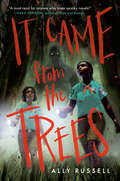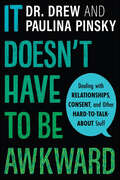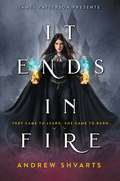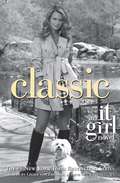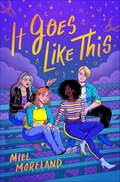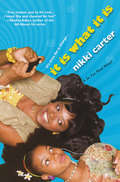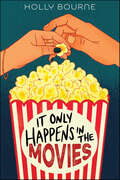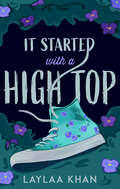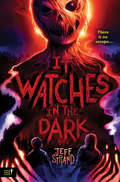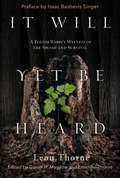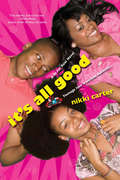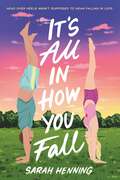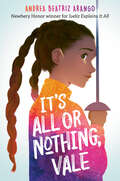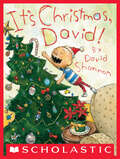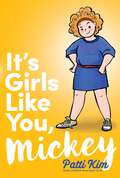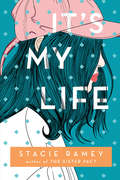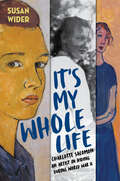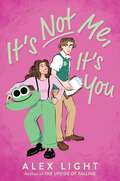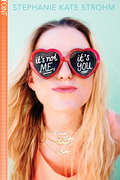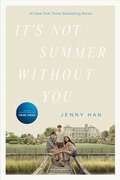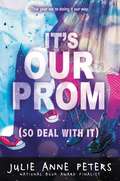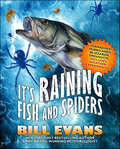- Table View
- List View
It Came from the Trees
by Ally RussellThe legend of Bigfoot gets a bone-chilling update in this scary story about a young girl and her scout troop who are willing to brave the woods to find her missing friend when no one else will. Perfect for fans of Daka Hermon and Claribel A. Ortega!The wilderness is in Jenna&’s blood. Her Pap was the first Black park ranger at Sturbridge Reservation, and she practically knows the Owlet Survival Handbook by heart. But she&’s never encountered a creature like the one that took her best friend Reese. Her parents don&’t believe her; the police are worthless, following the wrong leads; and the media isn&’t connecting the dots between Reese&’s disappearance and a string of other attacks. Determined to save her friend, Jenna joins a new local scout troop, and ventures back into the woods.When the troop stumbles across suspicious signs: huge human-like footprints near the camp, scratch marks on trees, and ominous sounds from the woods, Jenna worries that whatever took Reese is back to take her too. Can she trust her new scout leader? And will her new friend Norrie—who makes her laugh and reminds her so much of Reese—believe her?After the unthinkable happens, the scouts, armed with their wits and toiletries, band together to fight the monster and survive the night.
It Doesn't Have to Be Awkward: Dealing with Relationships, Consent, and Other Hard-to-Talk-About Stuff
by Drew Pinsky Paulina PinskyFrom celebrity M.D. Dr. Drew Pinsky and his daughter Paulina Pinsky comes an entertaining and comprehensive guide to sex, relationships, and consent in today’s #MeToo era. Perfect for teens, parents, and educators to facilitate open and positive conversations around the tricky topic of consent.When it comes to sex, relationships, and consent, establishing boundaries and figuring out who you are and what you want is never simple—especially as a teenager. What’s the line between a friendship and a romantic partner? How can you learn to trust your body's signals? And what if you’re not quite sure what your sexuality is? In this book, renowned celebrity M.D. Dr. Drew and his daughter Paulina Pinsky take on those awkward, incredibly important questions teens today are asking themselves and parents wish they had a better grasp on.Filled with tangible and accessible resources, and featuring humorous and raw personal anecdotes, this is the perfect guide for teens, parents, and educators to go beyond “the talk” and dive into honest and meaningful conversations about sex, relationships, and consent.
It Ends With You
by S. K. Wright'A darkly clever teen murder mystery [...] that succeeds in undermining everything you've come to believe and trust. S K Wright pulls off a difficult trick with apparent ease' Crime ReviewIf I'd told the truth, it would have been fiction.Everyone loves Eva. Beautiful, bright, fun, generous - she's perfect. So when her body is found in a ditch in the local woods the only thing anyone wants to know is: Who could have done this?It has to be Luke, her boyfriend. He has the motive, the means, the opportunity and he's no stranger to the police. Even though the picture is incomplete, the pieces fit. But as time passes, stories change.Who could have done this? You decide.It Ends With You is clever and compulsive. It challenges preconceptions, makes you second-guess yourself with each chapter, and it holds an uncomfortable mirror up to the way societies and systems treat outsiders.
It Ends in Fire
by Andrew ShvartsOnly those from the most powerful magical families can attend Blackwater Academy, but new student Alka has them fooled. Now it's time to take down the oppressive wizard ruling class from the inside. Alka Chelrazi is on a mission: 1. Infiltrate Blackwater Academy 2. Win the Great Game 3. Burn Wizard society to the ground. <p><p> As a child, Alka witnessed her parents' brutal murder at the hands of Wizards before she was taken in by an underground rebel group. Now, Alka is deep under cover at the most prestigious school of magic in the Republic: Blackwater Academy, a place where status is everything, where decadent galas end in blood-splattered duels, where every student has their own agenda. To survive, Alka will have to lie, cheat, and kill to use every trick in her spy's toolkit. And for the first time in her life, the fiercely independent Alka will have to make friends, to recruit the misfits and the outcasts into her motley rebellion. <p><p> But even as she draws closer to victory—to vengeance —she sinks deeper into danger as suspicious professors and murderous rivals seek the traitor in their midst, as dark revelations unravel her resolve. Can Alka destroy the twisted game... without becoming a part of it?
It Girl #10: Classic (It Girl #10)
by Cecily Von ZiegesarIt's almost Valentine's Day at Waverly Academy, and love is in the air. . . and in everyone's inboxes. Each year, The Waverly Computer Society runs Perfect Match, an online personality survey that pairs up Waverly Owls with their supposed soul mates. Now the campus is overrun with peculiar pairings, odd couples, and mischief makers hoping to play Cupid for a day. Jenny Humphrey is convinced she'll be paired with her adorable new boyfriend, Isaac Dresden. But when he starts acting skittish, she begins to wonder if he's her Perfect Match after all. Brett Messerschmidt and Tinsley Carmichael definitely aren't feeling the love this Valentine's Day: when Isla Dresden, Isaac's sister, steals Tinsley's thunder - and Brett's boyfriend - the two girls vow to plot their revenge. Callie Vernon is starting to wonder if a girl can have two soulmates. She's in love with both Easy Walsh and Brandon Buchanan, but on February 14th , she can only give one of them her heart. In this final dramatic It Girl novel, the Waverly Owls ponder an age-old question: is all really fair in love and war?
It Goes Like This
by Miel MorelandIn Miel Moreland's heartfelt young adult debut, It Goes Like This, four queer teens realize that sometimes you have to risk hitting repeat on heartbreak.Eva, Celeste, Gina, and Steph used to think their friendship was unbreakable. After all, they've been though a lot together, including the astronomical rise of Moonlight Overthrow, the world-famous queer pop band they formed in middle school, never expecting to headline anything bigger than the county fair.But after a sudden falling out leads to the dissolution of the teens' band, their friendship, and Eva and Celeste's starry-eyed romance, nothing is the same. Gina and Celeste step further into the spotlight, Steph disappears completely, and Eva, heartbroken, takes refuge as a songwriter and secret online fangirl...of her own band. That is, until a storm devastates their hometown, bringing the four ex-best-friends back together. As they prepare for one last show, they'll discover whether growing up always means growing apart. "It Goes Like This was everything my music nerd heart needed AND wanted. Lyrical and heart-wrenching...beautiful representation, sweetest longing and the pop-star romance of my dreams; Swifties will swoon happily with this story tattooed on their hearts." —Erin Hahn, author of You'd Be Mine and More Than Maybe
It Is What It Is: A So For Real Novel (So For Real Ser.)
by Nikki CarterGia's got to face the good, the bad, and the new. . . Gia Stokes is psyched for the start of her junior year at Longfellow High. She's co-captain of the Hi-Steppers dance squad, she's back on good terms with her cousin Hope, and her best friend Ricky has achieved hottie status as the school's new first-string quarterback. Now all the girls are after him, including Valerie--Gia's co-captain--and Hope. They both want Gia's help to score a date with Ricky, but how is Gia supposed to choose between them? If that wasn't enough, she also has to deal with a new dad and an annoying fourteen-year-old stepsister. It's going to take every ounce of faith Gia has to flip this script and make her junior year one to remember. "Gia Stokes might be a Hi-Stepper, but this teen role model has both feet on the ground as she meets life's challenges with style and grace." --Melody Carlson, author of the Diary of a Teenage Girl series
It Only Happens in the Movies
by Holly BourneFrom award-winning author Holly Bourne comes a clever, deconstructed rom-com that proves that in real life “girl meets boy” doesn't always mean “happily ever after” . . . or does it? At turns funny, feminist, and achingly real, this read is perfect for fans of Sophie Kinsella, Patrick Ness, and Julie Buxbaum.Audrey is over romance. While dealing with her parents’ contentious divorce, a breakup of her own, and shifting friendship dynamics, she has every reason to feel cynical.But then she meets Harry, her fellow coworker at the local cinema. He’s brash, impulsive, and a major flirt. And even though Audrey tries to resist, she finds herself falling for his charms.But in this funny, insightful, and ultimately empowering novel, love—and life—isn’t what it’s like in the movies.
It Started With a High Top
by Laylaa KhanSometimes, Cinderella has to take matters into her own hands to get her shoe back.Annabelle (known as Anne) has had a favorite pair of high tops for years. They belonged to her mother and when she wears them she feels especially connected to her mom, a divorced Egyptian immigrant raising four kids and working long hours at the hospital. These shoes are Anne&’s super power. But then one day one goes missing from her gym locker. Her search for the missing shoe forces her to enlist the help of her brother&’s best friend, Hunter. Anne has always had a crush on Hunter, but he&’s never really thought of her as anything other than a friend. However, as they spend more time together both at their jobs in a local bakery and looking for Anne&’s lost shoe, he&’s left wondering if they could be more.In fairytales, it&’s usually the prince who saves the day, but this princess is going to have to rescue herself—and maybe the prince as well—if she&’s going to get a happily ever after.
It Watches in the Dark (Eek!)
by Jeff Strand"She glanced over her shoulder. Had the scarecrow moved? It stood there, smile stitched on its face, but now it felt like a smirk."Prepare to be scared silly in this creepy middle-grade novel! Twins seek medical help in a remote village after their father is in a canoeing accident...only to discover the scarecrow that stands watch in town may have a stronger hold over the residents than expected. Perfect for fans of R.L. Stine, Dan Poblocki, and Mary Downing Hahn.Twins Oliver and Trisha love going on adventures with their dad. Canoeing and camping on the Champion River will be their best trip yet! But when they capsize in rapids, their father is knocked unconscious. Alone and without cell phone reception, their only choice is to continue down river for help.Hours of paddling brings them to an old dock, and a narrow path leads them to a small village. The townspeople are kind and helpful, but strangely focused on the giant scarecrow in the village square. "He watches over us," the twins are told in whispers. "He keeps us safe."An old woman warns the twins not to spend the night in the village. Not if they ever want to leave. But with the sun soon to set and their father not well enough to be moved, how can they escape? More importantly, can they survive?
It Will Yet Be Heard: A Polish Rabbi's Witness of the Shoah and Survival
by Leon ThorneNobel laureate Isaac Bashevis Singer once described Dr. Leon Thorne’s memoir as a work of “bitter truth” that he compared favorably to the works of Tolstoy, Dostoevsky, and Proust. Out of print for over forty years, this lost classic of Holocaust literature now reappears in a revised, annotated edition, including both Thorne’s original 1961 memoir Out of the Ashes: The Story of a Survivor and his previously unpublished accounts of his arduous postwar experiences in Germany and Poland. Rabbi Thorne composed his memoir under extraordinary conditions, confined to a small underground bunker below a Polish peasant’s pigsty. But, It Will Yet Be Heard is remarkable not only for the story of its composition, but also for its moral clarity and complexity. A deeply religious man, Rabbi Thorne bore witness to forced labor camps, human degradation, and the murders of entire communities. And once he emerged from hiding, he grappled not only with survivor’s guilt, but also with the lingering antisemitism and anti-Jewish violence in Poland even after the war ended. Harrowing, moving, and deeply insightful, Rabbi Thorne’s firsthand account offers a rediscovered perspective on the twentieth century’s greatest tragedy.
It's All Good: A So For Real Novel
by Nikki CarterKeeping it real isn't always easy. . .Gia Stokes can't wait for the debutante ball that will help celebrate the end of her junior year. She's been crushing hard on her best friend Ricky?and is hoping he'll ask her to the dance. But her friend Kevin has been looking hot too?and Gia isn't the only one at Longfellow High who's noticed. As if Gia's boy trouble wasn't enough, she's also got to deal with Valerie, who's still bitter about losing the Homecoming Queen crown and has convinced the Hi-Steppers dance squad that it's time for revenge. And then there's Sascha Cohen, who's about to get caught in a scandal that will make Gia and her friends think twice before they let their high school crushes turn into something more. . ."Full of fun-loving, unforgettable characters that readers will love. . ." --ReShonda Tate Billingsley, author of The Good Girlz series on Step to This
It's All Your Fault (Scholastic Press Novels)
by Paul RudnickOne last chance. One wild weekend. Flat out the funniest book of the year."Paul Rudnick makes me lie hysterical on the floor, screeching with laughter and sobbing with fury that I can't write the way he does." -- E. Lockhart, author of We Were Liars and The Disreputable History of Frankie Landau-BanksMy name is Caitlin and up until forty-eight hours ago I had never:Tasted alcohol, kissed a boy, sang in public at the top of my lungs, kidnapped anyone or -- WHAT? STOLEN A CONVERTIBLE?Now I'm in jail and I have no idea what I'm going to tell:The police, my parents, the mayor, all of those camera crews and everyone on Twitter.I have just noticed that:My nose is pierced and I have-WAIT? IS THAT A TATTOO?I blame one person for this entire insane weekend:My famous cousin.Who is also my former best friend.Who I have HATED for the past four years.Who I miss like crazy. NO I DON'T!!!!IT'S ALL YOUR FAULT, HELLER HARRIGAN!!!!
It's All in How You Fall
by Sarah HenningA contemporary young adult romance about moving on, finding your place, and recovering after life falls apart. Gymnast Caroline Kepler has three state balance beam titles, a new trick even most elites can&’t do—and chronic, undeniable back pain. While she might never be an Olympian, she has dreams of leveling up to elite, making Nationals, and competing in college. But when one epic face-plant changes all that and Caroline&’s back pain goes from chronic to career-ending, her dreams are shattered and her life is flipped upside down. Enter Alex Zavala, a three-sport athlete who&’s both incredibly cute and incredibly off-limits. He offers to give Caroline a crash course in all the sports she&’s missed, and she has an offer for him in return: For every sport Alex teaches her, she&’ll play matchmaker for him. Deal done, Caroline &“dates&” new sports with Alex for the rest of the summer, which is loads more fun than wallowing in despair. Just as Caroline starts to see herself as more than her past athletic successes, she picks up something she didn&’t bargain for: a big fat crush on Alex. Turns out life was way easier when it was just layout-fulls and beam burns....
It's All or Nothing, Vale
by Andrea Beatriz ArangoA poignant novel in verse in which, after a life-changing accident, one girl finds her way back to her life&’s passion. From the Newbery Honor-winning author of Iveliz Explains It All.All these months of staring at the wall?All these months of feeling weak?It&’s ending—I&’m going back to fencing.And then it&’ll belike nothing ever happened.No one knows hard work and dedication like Valentina Camacho. And Vale&’s thing is fencing. She&’s the top athlete at her fencing gym. Or she was . . . until the accident.After months away, Vale is finally cleared to fence again, but it&’s much harder than before. Her body doesn&’t move the way it used to, and worst of all is the new number one: Myrka. When she sweeps Vale aside with her perfect form and easy smile, Vale just can&’t accept that. But the harder Vale fights to catch up, the more she realizes her injury isn&’t the only thing holding her back. If she can&’t leave her accident in the past, then what does she have to look forward to?In this moving novel from the Newbery Honor-winning author of Iveliz Explains It All, one girl finds her way back to her life&’s passion and discovers that the sum of a person's achievements doesn&’t amount to the whole of them.
It's Christmas, David!
by David ShannonThe bestselling star of No, David! turns Christmas traditions upside down with laugh-aloud humor.Readers of all ages will vividly remember trying to peek at hidden gift packages; writing scrolls of wish lists to Santa; and struggling to behave at formal Christmas dinner parties. Always in the background, we know Santa Claus is watching, soon to decide if David deserves a shiny new fire truck or a lump of coal under the tree. From playing with delicate ornaments to standing in an endlessly long line for Santa, here are common Christmas activities--but with David's naughty trimmings. A surefire hit that is destined to be an annual classic.
It's Girls Like You, Mickey
by Patti Kim&“Bursts with personality and energy.&” —Kirkus Reviews Mickey navigates the pitfalls, heartbreaks, and triumphs of seventh grade in this uplifting companion to I&’m Ok, which award-winning author Gene Luen Yang praised as &“funny and heartfelt.&”For the first time in her confident, bold life, Mickey McDonald is nervous about starting school. Her best friend, Ok, has moved away; her father has probably left town for good; and she can&’t afford to go back-to-school shopping. But she&’s going to make the most of things because that&’s the kind of person Mickey is. Nothing&’s going to stand in her way or get her down. Still, the first few days of school are rough, until she becomes friends with Sun Joo, who has just moved to town. Their connection is instant and strong. But things get complicated when Sydney, the popular (and mean) girl in Mickey&’s class, also takes a shine to Sun Joo. Suddenly Mickey is facing her first ever friend breakup, and it&’s getting harder and harder to keep her chin up. Luckily, Mickey&’s made of tough stuff.
It's Me, Jennifer (Jennifer #1)
by Jane SorensonJennifer Green is twelve years old when she attends Sunday school for the first time. Although she's always thought of God as her friend, she discovers she doesn't know nearly as much about Him as the others in the class do. Once Jennifer feels more comfortable with God, she begins to confide in Him.
It's My Life
by Stacie RameyIf she wants a future with him, she'll have to make peace with her past.Jenna's never let her cerebral palsy get her down. But when she discovers that her condition was actually caused by an injury at birth, she's furious with her parents, who withheld the truth. And as they push her to get yet another difficult procedure, Jenna feels her control over her life starting to slip.Enter Julian, Jenna's childhood crush. He's just moved back to town, and he's struggling in school, so Jenna reaches out to him—anonymously—to help. Soon, their conversations are about so much more than class. She's falling for him all over again, hard and fast. But would Julian still be interested in her if he knew who she really was? And can she find a way to take back her own narrative before she pushes away everyone she loves?Also by Stacie Ramey:The Sister PactThe HomecomingThe Secrets We Bury
It's My Whole Life: Charlotte Salomon: An Artist in Hiding During World War II
by Susan WiderA gripping middle grade biography of Charlotte Salomon, and an ode to how art can capture both life’s everyday beauty and its monumental horrors. Charlotte Salomon was a German-Jewish artist born in Berlin. She is remembered for her autobiographical series of paintings, Life? or Theater?, which consists of 769 individual works painted between 1940 and 1942 while she was in hiding from the Nazis in the south of France, and which has been called a painted parallel to Anne Frank’s The Diary of a Young Girl and an early graphic novel. In 1943, she entrusted her collection of paintings to a friend. In October of that year, she was captured and deported to Auschwitz, where she and her unborn child were gassed to death upon arrival. It’s My Whole Life covers Charlotte’s remarkable life from her childhood and art school days to her time as a refugee in Nazi-occupied France, where she created the largest single work of art created by a Jew during the Holocaust. Compellingly written and accompanied by vivid color photographs of Salomon’s artwork, Susan Wider has crafted an illuminating portrait of an enigmatic and evanescent young artist.
It's Not Me, It's You
by Alex LightThe snark and instant chemistry of Better Than the Movies meets the indulgent summer fun and family hijinks of The Summer of Broken Rules in this compulsively readable rom-com from Alex Light, author of The Upside of Falling.Jackie Myers is a fraud. Or she might be a genius—the jury’s still out.The thing is, she secretly runs pleasebreakmyheart, a gone-viral account aimed at breaking hearts and ending relationships…. And she just used it to break up her insufferable eternal nemesis's picture-perfect relationship.Wilson is the buttoned-up, type A assistant manager of her nightmares—but it turns out he’s also, apparently, a really great boyfriend.So with her conscience (and paycheck) on the line, Jackie decides there’s only one thing to do: She’s going to help Wilson win his ex-girlfriend back. Which should be easy, considering Jackie hates him…right?
It's Not Me, It's You (Point Ser.)
by Stephanie Kate StrohmA laugh-out-loud look at one girl's epic dating history, as told by her friends, family, and foes!Did you hear...?NATALIE WAGNER, random freshman: Avery Dennis--the Avery Dennis--got dumped right before prom.COCO KIM, best friend: Avery has never been dumped! Well, okay, except for this one time.BIZZY STANHOPE, officially the worst: The head of the prom committee doesn't have a date to the prom. It is beyond pathetic. JAMES "HUTCH" HUTCHERSON, lab partner: Did Avery really swear off dating until she discovers why her relationships never work out? I'll believe that when I see it.ROBBY MONROE, ex-boyfriend: Did you get interviewed by Avery Dennis for her project?TRIPP GOMEX-PARKER, ex-boyfriend: Avery Dennis is straight-up interviewing everyone.AVERY DENNIS: recently dumped/topic of much gossip: Okay. Everyone is talking about it, so let's talk about it...From rising star Stephanie Kate Strohm, this is a laugh-out-loud look at one girl's epic dating history, as told by her friends, family, and foes.
It's Not Summer Without You: The Summer I Turned Pretty; It's Not Summer Without You; We'll Always Have Summer (The Summer I Turned Pretty #2)
by Jenny HanNow a blockbuster original series on Prime Video! Will Belly choose Jeremiah or Conrad? Belly finds out what comes after falling in love in this follow-up to The Summer I Turned Pretty from the New York Times bestselling author of To All the Boys I&’ve Loved Before, Jenny Han.It used to be that Belly counted the days until summer, until she was back at Cousins Beach with Conrad and Jeremiah. But not this year. Not after Susannah got sick again and Conrad stopped caring. Everything that was right and good has fallen apart, leaving Belly wishing summer would never come. But when Jeremiah calls saying Conrad has disappeared, Belly knows what she must do to make things right again. And it can only happen back at the beach house, the three of them together, the way things used to be. If this summer really and truly is the last summer, it should end the way it started—at Cousins Beach.
It's Our Prom (So Deal With It)
by Julie Anne PetersWhen Azure's principal gives her the chance to turn the school's traditional (and boring) senior prom into an event that will appeal to everyone, not just the jocks and cheerleaders, she jumps at the opportunity. Soon Azure manages to convince her best friends, Luke and Radhika, to join the prom committee as well.Facing heavy opposition and admittedly clueless about prom logistics, the three friends are nonetheless determined to succeed -- if Luke's and Azure's secret crushes on Radhika don't push the committee members, and their friendships, to the breaking point first.Told in two voices and filled with comical missed connections, It's Our Prom (So Deal With It) explores the ups and downs of planning an alternative prom -- while dealing with an unrequited crush on your best friend -- and shines with National Book Award finalist Julie Anne Peters's unmistakable wit and insight.
It's Raining Fish and Spiders
by Bill EvansOne of the things Bill Evans enjoys the most is talking to young people about weather. Middle-schoolers in particular, Evans says, are deeply interested in the natural world and in weather. It's Raining Fish and Spiders covers everything, from tornadoes and hurricanes to lightning and the different kinds of snowflakes. Evans addresses weather myths and facts, from "Can it really rain fish?" to "Will opening a window save my house during a tornado?" Evans also tells his most exciting personal weather stories: flying with the Hurricane Hunters, riding pell-mell through Tornado Alley with storm chasers, and visiting the coldest place on Earth. The book includes simple weather experiments that can be performed at home without expensive equipment.Extensively researched, fact-filled, and packed with charts, tables, illustrations, and amazing photographs, It's Raining Fish and Spiders is an entertaining and educational addition to the library of anyone interested in weather, science, and the natural world. At the Publisher's request, this title is being sold without Digital Rights Management Software (DRM) applied.
